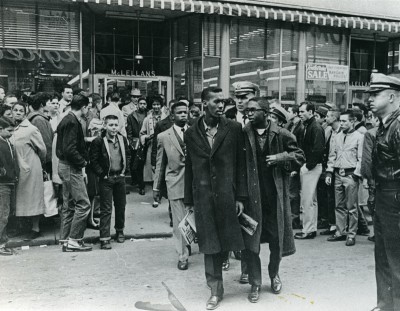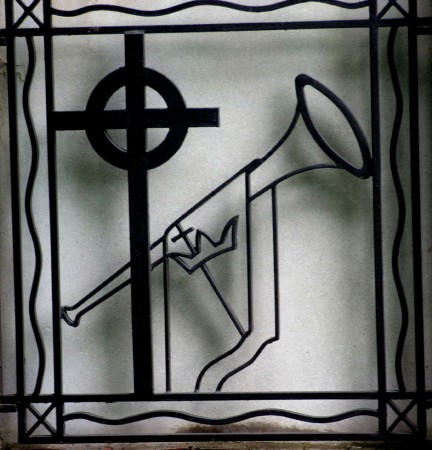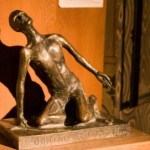 “Today this Scripture has been fulfilled in your hearing.”
“Today this Scripture has been fulfilled in your hearing.”
Jesus said it. According to Luke, Jesus said it as soon as he caught his breath from forty days of struggling with his personal demons in the wilderness. And he said those words right after he read these words from the prophet Isaiah: The Spirit of God has anointed me to bring good news to the poor . . .proclaim release to captives and recovery of sight to the blind . . . to let the oppressed go free . . . to proclaim the acceptable year of the Lord. He said this in his home town, in the synagogue where he had grown up, to people who had known him since he was a child.
What does it mean for things to be fulfilled in your hearing? It’s a conundrum to me. Most often people take it that Jesus meant in your seeing, that he was announcing his own divinity, holding them in awe. But that is clearly not the case, as the rest of the story, which is next week’s reading, will tell – he is going to make everyone in the room so mad they will hate the sight of him. Therefore, falling at his feet in worship is not the response he is looking for in this comment, on this day.
Some of us have looked at this more as an inaugural address, Jesus laying out his agenda, which becomes our divine todo list. But this also is wrong – in the next part of the reading he refuses to do the specific things that are on the lists of the people there, and he tells them he doesn’t intend to be a Wonder Worker.
What then does he mean? What have we heard here? What has been fulfilled, in our hearing?
 A colleague* wrote this story about her father, a man I knew in the last decades of his life. Born in Iowa, he’d been named Russell for his mother’s good friend Miranda Russell, an ex-slave; he’d gone to college on a football scholarship, and played with a team of mostly black men; he’d fought in a mainly black unit in WW2; and after the war he became a labor union organizer and negotiator. In April 1968 he went to Memphis, Tennessee with three other white men to write a contract for the Railway Brotherhood of Clerks. They couldn’t afford the hotel restaurant so they went down the street to a diner. When they finished dinner and walked outside, the road was filled with demonstrating African American garbage collectors involved in the strike that brought Martin Luther King to Memphis.
A colleague* wrote this story about her father, a man I knew in the last decades of his life. Born in Iowa, he’d been named Russell for his mother’s good friend Miranda Russell, an ex-slave; he’d gone to college on a football scholarship, and played with a team of mostly black men; he’d fought in a mainly black unit in WW2; and after the war he became a labor union organizer and negotiator. In April 1968 he went to Memphis, Tennessee with three other white men to write a contract for the Railway Brotherhood of Clerks. They couldn’t afford the hotel restaurant so they went down the street to a diner. When they finished dinner and walked outside, the road was filled with demonstrating African American garbage collectors involved in the strike that brought Martin Luther King to Memphis.
 Blocked from their hotel, the four men asked a policeman to help them, who said – “You just follow me, boys.” Holding his billy club at head level, he smashed a pathway clear for them. Their clothes became speckled with the blood of the strikers he hit. The four white men were so terrified they, like the crowd, walked helplessly behind him. But Russ was profoundly affected by it. King was assassinated later that night.
Blocked from their hotel, the four men asked a policeman to help them, who said – “You just follow me, boys.” Holding his billy club at head level, he smashed a pathway clear for them. Their clothes became speckled with the blood of the strikers he hit. The four white men were so terrified they, like the crowd, walked helplessly behind him. But Russ was profoundly affected by it. King was assassinated later that night.
When Russ came home from that trip to Memphis, he told his daughter about it – and he said it did not matter if she never acted with intolerance, or even if she never used one bigoted word: the racism of this country was her personal responsibility as it was his, he said. The path of comfort and education and well-being they both lived in had been swept clear by the pain and blood of others — native people the white colonists found here and African people they dragged from their homes in chains. He said we were all personally responsible until everyone could walk that path freely.
Fulfilled in your hearing. Jesus was saying his voice was anointed, and that was Isaiah’s self-understanding, too. Isaiah said his tongue had been cauterized so he could speak for God. Jesus said he was anointed to proclaim good news, not just any good news, but the good news of God’s agenda for a just time. All of this came from his mouth to our ears, as a kind of cauterizing speech, so that we would no longer be deaf or dumb in the conversation of oppression, we would speak of God’s devotion to the poor, we would speak up for captives and respect the infirm, and we would no longer have our ears full of temptations to hear evil with a shrug of acceptance.
So many Christians ignore this and prefer to say the text means the opposite, that Jesus means to do good for us, the church folk who are, we like to say, his hometown. The white church folks of Mississippi believed that in 1968. And all around the nation that understanding of God and Jesus is still preached.
 Here we are, then, hearing this passage in 2013, aware that Martin Luther King, Jr, understood it meant that his voice was anointed to speak for those who had no voice. Following Jesus he spoke for God, until the nation, all of us, killed him by our silence and by our rejection of his voice.
Here we are, then, hearing this passage in 2013, aware that Martin Luther King, Jr, understood it meant that his voice was anointed to speak for those who had no voice. Following Jesus he spoke for God, until the nation, all of us, killed him by our silence and by our rejection of his voice.
God’s agenda for an acceptable time remains. It is in our ears, we do know it, we have heard, our ears have been filled by it. Here we are, in a country full of scared immigrants and rich white people reviling them, and all who are poor; in a country filled with weapons bought to use against each other. We have just inaugurated a leader who will try to get us to sheath some of our weapons and study the meaning of human equality, the diversity that is our foundation, the meaning of peace for this world.
The memory of his memory has never left me, writes my friend of her father. This is what it means to be fulfilled in your hearing. Church folk claim exactly this about Jesus. It may well be something you need to hear in your hometown, from someone you have known since you were a child, or since he was. May our ears be full of this anointing.
____________________________________
* http://giftsinopenhands.wordpress.com/2013/01/19/881/,
from the post for 1/19/2013, in Gifts in Open Hands, by Maren Tirabassi
Illustrations:
1. Detail of the Prophet Isaiah, by Gentile da Fabriano, 1300s.
from Vanderbilt Divinity School, Art in the Christian Tradition
2. Civil Rights Protest in Nashville, 1950s. Image, Vanderbilt Divinity School Library, Art in the Christian Tradition.
3. Police brutality during Civil Rights Protest, Nashville. Image, Vanderbilt Divinity School Library, Art in the Christian Tradition.
4. Cross and trumpet, image of Victory. Vanderbilt Divinity School, Art in the Christian Tradition.















